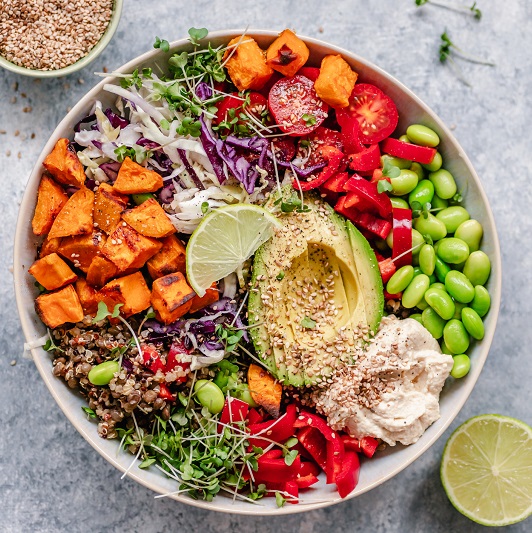How Your Diet Impacts Stroke Risk

October 09, 2023
There are certain stroke risk factors you can’t change, like your age or family history, but altering lifestyle habits, such as making dietary improvements, may significantly decrease your risk.
“Diet can be an important, powerful tool to reduce your risk of stroke,” interventional cardiologist, Madhav Upadhyaya, M.D. “What you eat has a notable impact on your overall health and stroke risk.”
Which foods may increase stroke risk?
Certain staples of the standard American diet are high in fat or nutrient-poor. When eaten regularly, they may increase your risk of stroke.
These foods include:
- Meat, including red meat and processed meat, which are high in saturated fat. They may raise cholesterol levels and increase heart disease risk, raising stroke risk.
- Full-fat dairy products, including butter and cheese, which are high in saturated fat.
- Sugary sweets, including soda, energy drinks, cookies, cakes and candy. They affect blood-sugar levels and may lead to diabetes, which increases stroke risk.
- Foods high in salt, including chips, pretzels and many processed foods. Salt may raise your blood-pressure levels, increasing your risk of stroke.
Which foods may reduce stroke risk?
Following a nutrient-dense, plant-based diet may help to lower stroke risk. Fruits, vegetables, nuts and other foods contain vitamins, minerals, fiber and healthy fats.
“When you focus on eating plant-based options, you make healthier choices,” Dr. Upadhyaya says. “You’re likely to crowd out saturated fats, salt and sugar from your diet.”
Following a plant-based diet doesn’t mean that you have to become a vegetarian. You may still eat meat, poultry or fish on occasion.
“Some people who are almost vegetarians call their eating style a ‘plant-based diet,’” Dr. Upadhyaya says. “Others say that they’re following the Mediterranean diet.”
To reduce your risk of stroke, add these foods to your diet:
- Fiber-rich fruits and vegetables in a variety of colors
- Beans, which are low-fat, fiber-rich and nutrient-dense
- Whole grains, rather than foods made with white flour
- Nuts and seeds, which contain healthy fats and fiber
- Low-fat or fat-free dairy products
- Fish or shellfish
- Olive oil and other healthy monounsaturated fats
- Water, instead of soda or sweetened beverages
It’s often easier to change your diet gradually, rather than revamping everything at once. Try adding or subtracting one food at a time, so it isn’t overwhelming.
“Even picky eaters can improve their diets to decrease their stroke risk,” Dr. Upadhyaya says. “Adopting these habits should benefit your health in the short and long term.”
Lifestyle Habits That Affect Stroke Risk
Many habits that increase the risk of heart disease also increase stroke risk. These unhealthy lifestyle habits include:
- Eating a diet high in calories, saturated fat, cholesterol and/or salt
- Smoking
- Being physically inactive
- Drinking more than one (for non-pregnant women) or two (for men) alcoholic beverages daily
Research has shown that lifestyle changes have the ability to lower stroke risk. To reduce your risk of stroke, adopt healthier practices, such as:
- Eating a healthy diet
- Quitting smoking
- Exercising daily
- Limiting your alcohol intake
Next Steps & Resources:
- Meet our source: Madhav Upadhyaya, M.D.
- To make an appointment with Dr. Upadhyaya, or a doctor near you, call 800-822-8905 or visit our website.
- Learn more about heart care at Hackensack Meridian Health
The material provided through HealthU is intended to be used as general information only and should not replace the advice of your physician. Always consult your physician for individual care.






